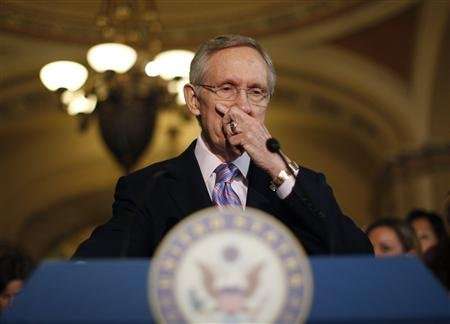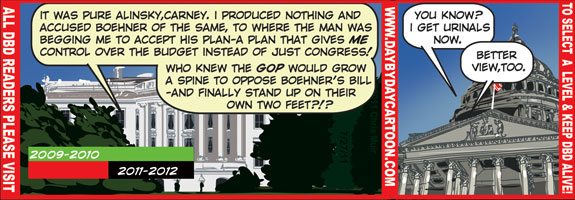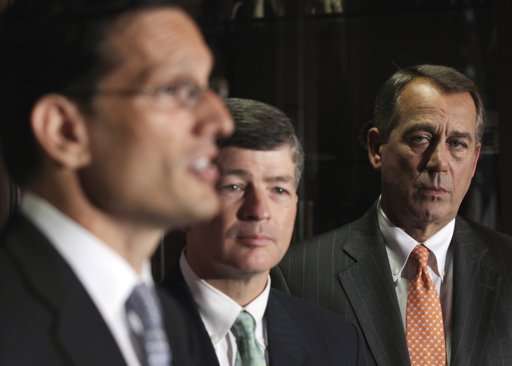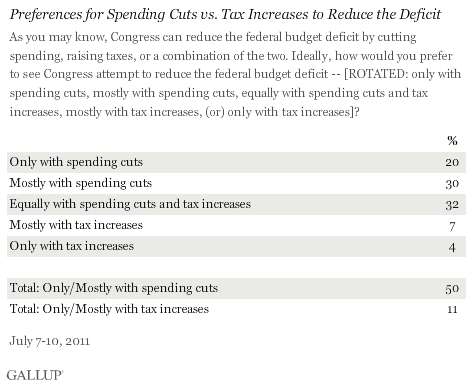-
Senate Democrats Send Speaker Boehner a Letter Favoring an American Debt Default?

Senate Majority Leader Harry Reid is pictured as he speaks to the press following more U.S. debt reduction talks on Capitol Hill, July 26, 2011
Well, something like that because their letter promises to reject Boehner’s Debt-Limit Plan.Fifty-three Democratic senators have signed a letter to House Speaker John A. Boehner saying they intend to vote against his plan for an increase in the debt ceiling, virtually assuring its defeat in the Senate even as the speaker lines up Republican votes to pass it in the House on Thursday.
Votes are not final until they are cast. But if the Democrats hold to their promise in the letter, Mr. Boehner’s plan for a six-month increase in borrowing authority will not make it to President Obama’s desk.
“We heard that in your caucus you said the Senate will support your bill,” the senators say in the letter. “We are writing to tell you that we will not support it, and give you the reasons why.”
In the letter, the senators argue that a short-term extension of the debt ceiling would “put America at risk” and “could be nearly as disastrous as a default.”
Some compromise there, eh?
I say the House GOP and whatever Democrats who dare, pass the bill anyway and dare Dingy Harry to hold it up for defeat in the Senate.
To the Democrats then, you voted twice against House passed plans, so if it breaks the American economy, you own it baby – House/Senate Democrats and President Obama.
Here is the double dare letter to Boehner:
Dear Speaker Boehner,
With five days until our nation faces an unprecedented financial crisis, we need to work together to ensure that our nation does not default on our obligations for the first time in our history. We heard that in your caucus you said the Senate will support your bill. We are writing to tell you that we will not support it, and give you the reasons why.
A short-term extension like the one in your bill would put America at risk, along with every family and business in it. Your approach would force us once again to face the threat of default in five or six short months. Every day, another expert warns us that your short-term approach could be nearly as disastrous as a default and would lead to a downgrade in our credit rating. If our credit is downgraded, it would cost us billions of dollars more in interest payments on our existing debt and drive up our deficit. Even more worrisome, a downgrade would spike interest rates, making everything from mortgages, car loans and credit cards more expensive for families and businesses nationwide.
In addition to risking a downgrade and catastrophic default, we are concerned that in five or six months, the House will once again hold the economy captive and refuse to avoid another default unless we accept unbalanced, deep cuts to programs like Medicare and Social Security, without asking anything of the wealthiest Americans.
We now have only five days left to act. The entire world is watching Congress. We need to do the right thing to solve this problem. We must work together to avoid a default the responsible way – not in a way that will do America more harm than good.
And, here I thought Dingy Harry “The Iraq War is Lost” Reid was a deal maker?
Default, here we come….
-
John Boehner’s Debt-Limit Plan is a Good Start?
It is a good start towards replacing Obama as President next year.
It is, as many conservatives have said in floor speeches and statements of support for the Boehner bill, an important first step. The immediate cuts are small relative to our $14 trillion debt, but the trajectory of spending will now go down.
Before we get ahead of ourselves, it is important to remember this has to come to a vote in the House. (I suspect it won’t be all that close, unfortunately relieving some die-hards of the necessity of discarding their political purity.) It also has to get through the Senate, where other hardline Republicans, not to mention a whole lot of Democrats, will have to decide: Boehner or default?
And should this get through both houses, the president will have zero choice in the matter. He will sign it, and we will avoid default. And then the spinning begins. As for those GOP pols and pundits who favored the burn-down-the-building approach, there is perhaps time to reconsider whether they want to be on board with a vote that may change the course of our fiscal future and the shape of the Republican party.
Read Rep. Paul Ryan’s treatise on the revised legislation here.
And, looking at the polls today in the key battleground states, in another year, the GOP House Leadership will not have to worry about negotiating with Harry Reid or the White House.
-
Day By Day July 27, 2011 – The View

Day By Day by Chris MuirChris, the best approach is probably to swallow hard, bend over and accept the Boehner Plan. It certainly is NOT perfect, but the GOP and people have won and should now consolidate the gains by beating Obama in the race for 2012.Then, it will be over to Harry Reid and Obama to decide whether they want to push America into default or not.
I bet they cave.
with Obama’s poor polling in key battleground states, the GOP can afford to sit back and wait while they select a nominee. The next four years are too important to be squandered over cuts that won’t be seen in 10 years.
Declare victory and call it a day —> over to Obama.
Previous:
The Day By Day Archive -
The Debt-Limit Debate: Call it a Day and a Win GOP

House Speaker John Boehner of Ohio, right, and Republican Conference Chairman Rep. Jeb Hensarling, R-Texas , center, listen as House Majority Leader Eric Cantor of Va., left, speaks during a news conference at The Republican National Committee on Capitol Hill in Washington, Tuesday, July 26, 2011
Am I suggesting the GOP House Tea Party Caucus should hold their nose and vote for the Boehner debt-limit plan?
Yes, if you want to beat President Obama in 2012.The debt-limit debate is heading toward a culmination, with President Obama reduced to pleading for the public to support a tax increase and Speaker John Boehner and Senate Majority Leader Harry Reid releasing competing plans that are the next-to-last realistic options. The question now is whether House Republicans are going to help Mr. Boehner achieve significant progress, or, in the name of the unachievable, hand Mr. Obama a victory.
Mr. Obama recognizes these stakes, threatening yesterday to veto the Boehner plan in a tactical move to block any Democratic support. The White House is afraid that it will pass the House and then become the only debt-ceiling vehicle if Mr. Reid can’t get 60 votes for his own proposal in the Senate. This would short-circuit Mr. Obama’s plan to blame the GOP for a U.S. credit downgrade, any market turmoil, a possible default, and the lousy economy too.
Read all of the rest of the piece.
The fact is American voters WILL blame the GOP for a further collapse in the economy and the polling is clear on the matter. Plus, there is no need for frightened credit markets or a possible default.
We will never achieve entitlement or tax reform with a doctrinaire liberal in the White House. Any agreements to do so in “out years” would probably be unenforceable even if agreement were achieved. And we can only do so much while controlling one half of one branch of government. Ladies and Gentlemen of the House Republicans, you have laid some great groundwork to rectify both of those situations. Now it is the time to accept a well-won victory and move on.
Thompson is RIGHT – time to move on, vote for the Boehner Plan and if Obama vetoes it, then he broke it.
-
Poll Watch: Americans Favor Obama’s Mixed Solution for Debt-Limit Deal 56% Vs. 19%
According to the latest Reuters/Ipsos Poll.
Showing an intensity of interest among Americans who often ignore the intricacies of policy in Washington, 83 percent of those polled said they were either very or somewhat concerned about the potential for a U.S. debt default on August 2.
The poll found that 56 percent of Americans want to see a combination of government spending cuts and tax increases included in a deal to bring down the U.S. budget deficit and permit a vote to raise the country’s $14.3 trillion debt ceiling.
This is the approach favored by Obama and his fellow Democrats to begin to put America’s fiscal house in order.
Republicans oppose tax increases and instead want to cut back deeply on spending, saying the federal budget has gotten out of control.
“It does seem to be that the popular narrative is falling on the side of the president on this one,” said Ipsos pollster Julia Clark.
In the poll, 19 percent said the best approach is only to cut existing programs, and 12 percent said only raising taxes would be the favored solution.
Obama’s Democrats and their Republican rivals have so far failed to forge agreement and are pursuing competing debt plans to avert a potentially disastrous default.
But, that is not saying that American voters know what is best for the economy or the government, especially with the President telling them he will only tax the rich.
So, for the debt-ceiling impasse, who do the voters blame?
The Reuters/Ipsos poll found that 31 percent of respondents held Republican lawmakers responsible for the debt impasse, 21 percent blamed Obama and 9 percent blamed Democratic lawmakers.
Along those lines, 29 percent said Republican lawmakers should give the most ground in the negotiations, a quarter said Obama should and a fifth said Democrats should.
The debt debate has potential consequences for the 2012 election year when Obama is seeking a second term as president.
People who identified themselves as political independents, who Obama needs to win re-election, tended to side with the Republicans. The poll found that 29 percent of independents said Obama should give the most ground in the negotiations, while 13 percent said Republicans should.
This is the polling the Democrats will argue places the voters on their side of the debt-limit argument. But, I do not think this will move the narrative for the GOP. The GOP will NEVER accept tax increases, but they may swallow some tax reform.
In fact, in a breaking piece of news, the GOP House Leadership has just announced that they will have to re-write the Boehner proposal in order to obtain 218 votes for passage. Senator Harry Reid has already stated that in the Senate the Boehner proposal is DOA.
So, if the GOP already knows that if they are getting the blame for this financial impasse in an economic climate that Obama now owns, they may be MORE inclined to compromise and just call it a day.
-
Video: The White House Spends 10 Minutes Saying They Won’t Release a Debt Ceiling Plan They Might Not Have
White House press asks Carney a simple question: why not release the plan?Why not?
Leadership by default. -
Day By Day July 25, 2011 – Truck Stop
 Notwithstanding Sam, but President Obama is throwing the American people under the bus in insisting on a debt ceiling deal that carries past the 2012 Presidential elections. Actually, he is playing Russian Roulette with the world-wide financial markets.
Notwithstanding Sam, but President Obama is throwing the American people under the bus in insisting on a debt ceiling deal that carries past the 2012 Presidential elections. Actually, he is playing Russian Roulette with the world-wide financial markets.The House GOP should send him a short term “all cuts” deal and dare the Democrats in the Senate and/or the White House to block it.
Then, the Dems/Obama break it, they OWN it.
Previous:
The Day By Day Archive -
Mark Steyn: Planless Dems
 In this post, Mark Steyn talks about the austerity budgets in Europe and what may be coming very soon to the United States, if the Congress and President Obama do not get serious about government spending.
In this post, Mark Steyn talks about the austerity budgets in Europe and what may be coming very soon to the United States, if the Congress and President Obama do not get serious about government spending.It seems reasonable to conclude from the planlessness and budgetlessness of the Obama/Reid Democrats that their only plan is to carry on spending without limit. Otherwise, someone somewhere would surely have written something down on a piece of paper by now. But no, apparently the Department of Writing Down Plans is the only federal expense the president is willing to cut. You begin to see why the Europeans are a little miffed. They’re passing austerity budgets so austere they’ve spawned an instant anti-austerity movement rioting in the street — and yet they’re still getting downgraded by the ratings agencies. In Washington, by contrast, the ruling party of the Brokest Nation in History has no spending plan other than to plan to spend even more — and nobody’s downgrading them.
Well, don’t worry. It’s coming. The domestic media coverage of this story has been almost laughably fraudulent: To the court eunuchs, a failure to raise the debt ceiling by a couple of trillion would signal to the world that American government was embarrassingly dysfunctional. In reality, raising the debt ceiling by a couple of trillion without any spending cuts would confirm to the world that American government is terminally dysfunctional.
In the debt-ridden treasuries of Europe, they’re talking “austerity.” In the debt-ridden treasury of Washington, they’re talking about more spending (Kathleen Sebelius is touting new women’s health programs to be made available “without cost.”) At the risk (in Samuel Johnson’s words) of settling the precedence between a louse and a flea, I think Europe’s political discourse is marginally less deranged than ours. The president is said to be “the adult in the room” because he is reported to be in favor of raising the age of Medicare eligibility from 65 to 67.
By the year 2036.
If something is not done soon, the financial markets will react for the Congress and the President.
It won’t be pretty and all the POLS will be able to do will be to try to blame the other side.
Why can’t they simply pass a short term compromise and have the great debate in 2012?
Or, does President Obama relish a financial crisis for re-election demagoguery?
-
Mark Steyn: No Bargaining with Barack Obluffer
 Another masterful piece from Mark Steyn.
Another masterful piece from Mark Steyn.There is something surreal and unnerving about the so-called “debt ceiling” negotiations staggering on in Washington. In the real world, negotiations on an increase in one’s debt limit are conducted between the borrower and the lender. Only in Washington is a debt increase negotiated between two groups of borrowers.
Actually, it’s more accurate to call them two groups of spenders. On the one side are Obama and the Democrats, who in a negotiation supposedly intended to reduce American indebtedness are (surprise!) proposing massive increasing in spending (an extra $33 billion for Pell Grants, for example). The Democrat position is: You guys always complain that we spend spend spend like there’s (what’s the phrase again?) no tomorrow, so be grateful that we’re now proposing to spend spend spend spend like there’s no this evening.
On the other side are the Republicans, who are the closest anybody gets to representing, albeit somewhat tentatively and less than fullthroatedly, the actual borrowers – that’s to say, you and your children and grandchildren. But in essence the spenders are negotiating among themselves how much debt they’re going to burden you with. It’s like you and your missus announcing you’ve set your new credit limit at $1.3 million, and then telling the bank to send demands for repayment to Mr. and Mrs. Smith’s kindergartner next door.
Nothing good is going to come from these ludicrously protracted negotiations over laughably meaningless accounting sleights-of-hand scheduled to kick in circa 2020. All the charade does is confirm to prudent analysts around the world that the depraved ruling class of the United States cannot self-correct, and, indeed, has no desire to.
Read all of the piece.
The charade had better self-correct or we will be no more.
The time is NOW.
-
Poll Watch: Americans Prefer Spending Cuts But Are Open to Tax Increases
 According to the latest Gallup Poll.
According to the latest Gallup Poll.Americans’ preferences for deficit reduction clearly favor spending cuts to tax increases, but most Americans favor a mix of the two approaches. Twenty percent favor an approach that relies only on spending cuts and 4% favor an approach that uses tax increases alone.
These results are based on a July 7-10 Gallup poll, conducted as government leaders from both parties continued negotiating an agreement to raise the federal debt limit. Both Republicans and Democrats appear willing to raise the debt limit, provided the government outlines plans to significantly reduce federal deficits in the future. The parties generally agree on making deep spending cuts, but do not agree on whether tax increases should be included to help reach their target goals for deficit reduction. Many Republicans in Congress oppose any such tax increases; thus, the legislation may not pass if tax hikes are included.
Americans do not necessarily share this view, with 20% saying deficit reduction should come only through spending cuts. That percentage is a little higher, 26%, among those who identify as Republicans. Republicans do, however, tilt heavily in favor of reducing the deficit primarily if not exclusively with spending cuts (67%) as opposed to tax increases (3%). Fifty-one percent of independents share that preference. Democrats are most inclined to want equal amounts of spending cuts and tax increases (42%), though more favor a tilt toward spending cuts (33%) than tax increases (20%).
So, what does this all mean?
There is political cover for Republicans to accept some tax increases or tax reform in return for receiving massive concessions from Congressional Democrats and President Obama on government spending.
But, whether Republicans will accept ANY tax increases and then vote to increase the debt ceiling is doubtful.
The best approach may be for the GOP House to vote for a three or six month debt ceiling extension without tax increases (all cuts) and dare Democrats in the Senate to filibuster it or President Obama to exercise his veto.